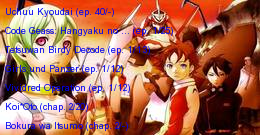This chapter was a substantial improvement over the dreadful one that preceded it, and, on it’s own right, it was pretty damn satisfying, but several unavoidable flaws continue to linger in Fujiwara’s approach to the conclusion of Usui and Misaki’s story. As such, it wasn’t quite as compelling and well-written as the first two chapters of this arc, due largely to it’s unexpectedly fleeting length. Thankfully however, it still possessed a rather beneficial balance within the isolated narrative of the chapter as a whole, particularly evident throughout the latter half.
I really enjoyed the momentary reappearance of Kuuga and Sakura’s relationship, since, aside from the extra chapter that merely illuminated a fragment of their romantic development, it has been woefully absent throughout much of the story, despite it’s relevance. Of course, the same could be said for nearly every single narrative thread that doesn’t directly relate to either Usui or, in particular, Misaki, since, though Fujiwara’s writing is typically impressive, her approach to the development of the secondary characters throughout the story has been quite disappointing, to say the least.
Misaki and Usui’s romantic moment was, along with the ending, one of the highlights of the chapter, beautifully portraying their ever-deepening intimacy. This aspect of the story has rarely faltered, as nearly every single interaction between them has been exceptionally well-illustrated and nuanced. Once again, Fujiwara deceptively teased them finally having sex without actually indulging that long-anticipated development, which, following the plethora of similarly subtle encounters between them throughout the latter half of the story, is certainly a bit frustrating, but, since she still managed to convey so much romantic depth and passion with nearly every flourish of this particular interaction, I can’t be too irritated at the absence of an inevitability.
Misaki’s conversation with her father was refreshingly uninterrupted, and yet, at the same time, it was also disappointingly littered with Misaki’s repetitious bouts of stubborn indignation at the father that continues to arduously support his family and, most importantly, Misaki herself, only ever offering her assistance and advice, all while he perpetually yearns for the smallest bit of reciprocated kindness. Though I understand her hesitance to fully accept and eventually forgive the father that effectively abandoned her (albeit for entirely altruistic reasons), this seeming inability to even begrudgingly acknowledge her own father’s existence is quite saddening and petty, particularly since the majority of their potentially beautiful conversations are hastily silenced by Misaki’s childish tendencies.
The conclusion to this chapter was a rather intriguing cliffhanger of sorts, as the revelation of her secret to the students of Seika has always been an inevitable and integral element within her development. The montage of Misaki’s reverie immediately prior to the final page was excellent, culminating with the succinctly illustrated realization that her life as a maid and as the president of Seika aren’t actually two disparate identities, but that they are, in fact, two halves of a cohesive and complex whole. However, though I certainly enjoy the finalistic nature of this development, it isn’t nearly as interesting and essential to the narrative as it once would have been, especially since her job at maid latte has become so disappointingly ancillary in the latter half of the story.
Though I’ve thoroughly enjoyed the majority of this arc, it’s become disappointingly obvious that, as a whole, it won’t be quite as satisfying and comprehensive as I was hoping, illuminated even further by the unexpected repetition and the pointless prevalence of comedic antics, which consistently displays, most of all, an unfortunate lack of focus within the story. This, in turn, has indicated a partial inability for the myriad of character and narrative resolutions to be properly addressed. Of course, should the final chapter be followed by several short stories that satisfyingly explore Usui and Misaki’s future, along with a focus on a few of the more compelling supporting characters, then this criticism will likely become somewhat diminished.
Despite the noticeable decline in quality following the 57th chapter, I’m cautiously looking forward to the ending of what was once my favorite shoujo. Hopefully the resolution to Misaki and Usui’s story will be appropriately romantic and satisfyingly conclusive. Unfortunately, due to the restrained nature of the narrative at the moment, even a glimpse of Usui and Misaki’s wedding in the final chapter seems less and less likely. If that particularly grandiose and romantically significant moment does, in fact, remain absent, a time-skip that depicts a vignette of Usui and Misaki’s future together following their imminent, yet strangely indistinct, separation is rather essential. Anything else would likely seem terribly incomplete and unnecessarily vague. |





